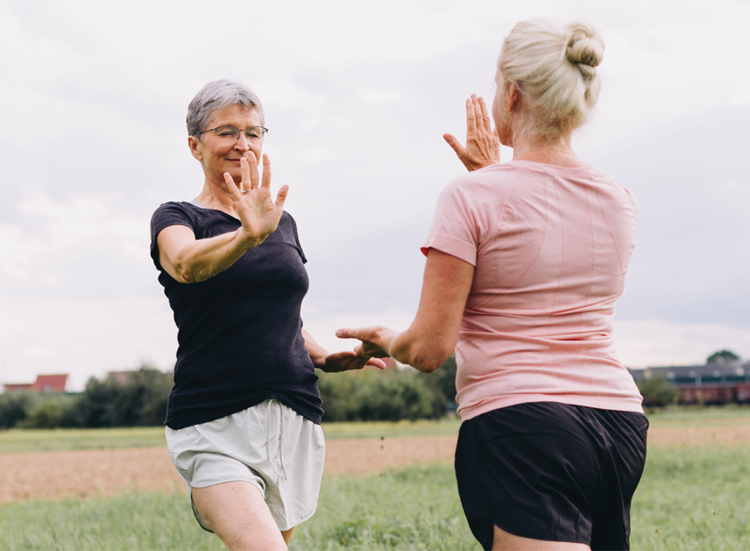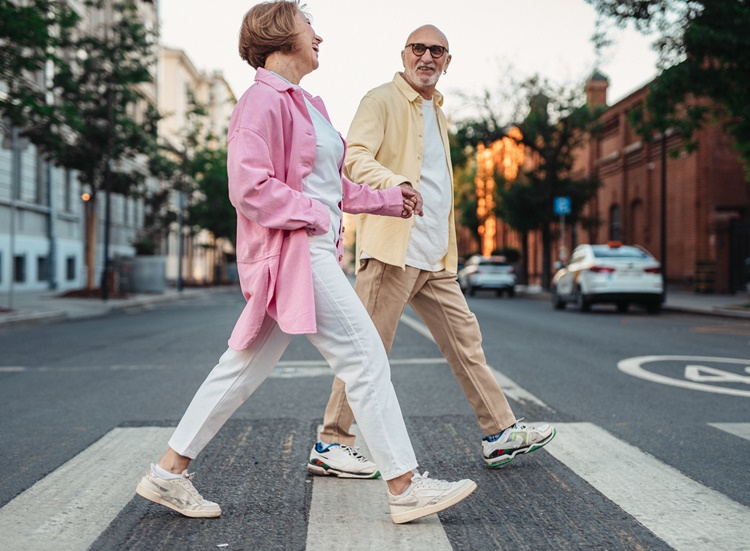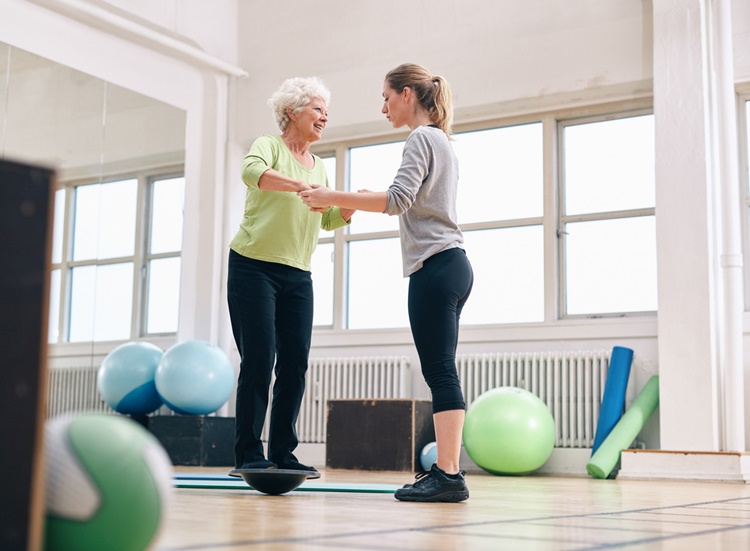Share your results
Please enter your email
Results shared!
We've sent a link to your email so you can access your results at any time.
Tai Chi has benefits for older people and people with injuries, as a low-impact, low-cost, but high-reward exercise.

Tai Chi is a gentle exercise option that's low in impact but high in reward.
It makes use of slow and careful movements that continuously shift your centre of gravity. This makes it a safe way to practice your balance control.
And it's suitable for older adults with chronic illness, allowing you to improve your health without exacerbating existing issues.
It's cost-effective and versatile, too. You can practice Tai Chi outside with others, or in the comfort and convenience of your own home.
All in all, there are many reasons you should consider giving Tai Chi a go.
Tai Chi is a gentle exercise option that's low in impact but high in reward.
It makes use of slow and careful movements that continuously shift your centre of gravity. This makes it a safe way to practice your balance control.
And it's suitable for older adults with chronic illness, allowing you to improve your health without exacerbating existing issues.
It's cost-effective and versatile, too. You can practice Tai Chi outside with others, or in the comfort and convenience of your own home.
All in all, there are many reasons you should consider giving Tai Chi a go.
Read less...
Regular light exercise, such as Tai Chi or chair yoga, has many benefits for older people.
You can learn more about exercise for healthy ageing and exercise recommendations for older people at LiveUp.
Regular light exercise, such as Tai Chi or chair yoga, has many benefits for older people.
You can learn more about exercise for healthy ageing and exercise recommendations for older people at LiveUp.
Read less...
Tai Chi's health benefits are many and well-studied.
A 2021 study found Tai Chi significantly improves cardiorespiratory fitness in older people. As well as strength, balance, mobility, sleep, and even cognition. And it reduces falls and stroke risk factors.
According to a 2023 literature review, it improves mobility and balance in older people more effectively than conventional exercise. And it's more efficient too.
Tai Chi's health benefits are many and well-studied.
A 2021 study found Tai Chi significantly improves cardiorespiratory fitness in older people. As well as strength, balance, mobility, sleep, and even cognition. And it reduces falls and stroke risk factors.
According to a 2023 literature review, it improves mobility and balance in older people more effectively than conventional exercise. And it's more efficient too.
Read less...
Tai Chi has been found to successfully decrease the rate of falls in older people. It practices your posture control, trunk rotation, weight transfer, and strength. All of which improve your balance.
According to Harvard Health Publishing, Tai Chi trains your proprioception. That's your ability to sense your body's position in space. It also builds your muscle strength and flexibility. Strengthening your upper and lower limbs, as well as the core muscles of your back and abdomen. All this helps you recover from stumbling more easily, so you end up less afraid of falling. And feeling more confident makes it even less likely you'll fall.
You can learn more about exercise for falls prevention and balance exercises to try at home with LiveUp.
Tai Chi has been found to successfully decrease the rate of falls in older people. It practices your posture control, trunk rotation, weight transfer, and strength. All of which improve your balance.
According to Harvard Health Publishing, Tai Chi trains your proprioception. That's your ability to sense your body's position in space. It also builds your muscle strength and flexibility. Strengthening your upper and lower limbs, as well as the core muscles of your back and abdomen. All this helps you recover from stumbling more easily, so you end up less afraid of falling. And feeling more confident makes it even less likely you'll fall.
You can learn more about exercise for falls prevention and balance exercises to try at home with LiveUp.
Read less....tmb-large%20card.jpg?sfvrsn=b88148ec_0)
Tai Chi could help you practice mindfulness. That's a type of calm mental state.
Now, you don't have to be interested in the history of Tai Chi to enjoy it as a physical exercise. However, like yoga, Tai Chi has roots in a spiritual philosophy. So, it comes with built-in breathing techniques and meditation practices. These encourage calmness in your mind and body.
It’s also an opportunity to join a group and connect with people in your area. Staying connected with your community is an important aspect of your mental health. It's a big part of ageing well.
Tai Chi could help you practice mindfulness. That's a type of calm mental state.
Now, you don't have to be interested in the history of Tai Chi to enjoy it as a physical exercise. However, like yoga, Tai Chi has roots in a spiritual philosophy. So, it comes with built-in breathing techniques and meditation practices. These encourage calmness in your mind and body.
It’s also an opportunity to join a group and connect with people in your area. Staying connected with your community is an important aspect of your mental health. It's a big part of ageing well.
Read less....tmb-large%20card.png?sfvrsn=fb8461f9_0)
First, put on loose, comfortable clothes. You can go barefoot or wear flexible shoes with thin soles.
You should be able to find a class in your area by looking online or checking your nearest community centre. You can even observe a class before participating, in many cases. You can also follow videos online, if you prefer to try it out at home.
If you're opting to follow instructional videos at home, have someone join you. And choose somewhere nice to practice. Make sure you have room to extend your arms around you. Check there's nothing on the floor or in your way. It might also be nice to find a place with natural light and a pleasant view.
First, put on loose, comfortable clothes. You can go barefoot or wear flexible shoes with thin soles.
You should be able to find a class in your area by looking online or checking your nearest community centre. You can even observe a class before participating, in many cases. You can also follow videos online, if you prefer to try it out at home.
If you're opting to follow instructional videos at home, have someone join you. And choose somewhere nice to practice. Make sure you have room to extend your arms around you. Check there's nothing on the floor or in your way. It might also be nice to find a place with natural light and a pleasant view.
Read less....tmb-large%20card.png?sfvrsn=84c8459_4)
Before you begin any new exercises, remember to listen to your body. Stop and seek advice from a medical professional if you feel new or increasing pain, or if you feel dizzy, clammy, or short of breath.
Some exercises may not be for you. Consult a medical professional if you are unsure.
Before you begin any new exercises, remember to listen to your body. Stop and seek advice from a medical professional if you feel new or increasing pain, or if you feel dizzy, clammy, or short of breath.
Some exercises may not be for you. Consult a medical professional if you are unsure.
Read less....tmb-large%20card.png?sfvrsn=493a5b01_0)
You can practice Tai Chi a little bit every day. Soon enough, you might find you can exercise for a longer time each day.
The Health Department recommends you do 30 minutes of moderate-intensity exercise on as many days as you can manage. But whatever you choose to do, even a little bit will go a long way.
Get advice from your healthcare professional when planning a new exercise regimen.
You can practice Tai Chi a little bit every day. Soon enough, you might find you can exercise for a longer time each day.
The Health Department recommends you do 30 minutes of moderate-intensity exercise on as many days as you can manage. But whatever you choose to do, even a little bit will go a long way.
Get advice from your healthcare professional when planning a new exercise regimen.
.tmb-large%20card.png?sfvrsn=e66329ad_2)
If you would like to find local exercise classes, social activities, and helpful tips, try the quick quiz by clicking on the 'Let's Go' button below.
You can also try these 10 chair yoga poses to improve your balance and mobility.
If you would like to find local exercise classes, social activities, and helpful tips, try the quick quiz by clicking on the 'Let's Go' button below.
You can also try these 10 chair yoga poses to improve your balance and mobility.
Read less...Australian Government Department of Health. (2021). Physical activity and exercise guidelines for older Australians (65 years and over). Australian Government. https://www.health.gov.au/topics/physical-activity-and-exercise/physical-activity-and-exercise-guidelines-for-all-australians/for-older-australians-65-years-and-over
Adler, P. A., & Roberts, B. L. (2006). The use of Tai Chi to improve health in older adults. Orthopedic Nursing, 25(2), 122-126. https://pubmed.ncbi.nlm.nih.gov/16572030/
Harvard Health Publishing. (2022). The health benefits of Tai Chi - Harvard Health. https://www.health.harvard.edu/staying-healthy/the-health-benefits-of-tai-chi
Hu, L., Wang, Y., Liu, X., et al. (2021). Tai Chi exercise can ameliorate physical and mental health of patients with knee osteoarthritis: Systematic review and meta-analysis. Clinical Rehabilitation, 35(1), 64-79. https://journals.sagepub.com/doi/10.1177/0269215520954343
Huang, Z., Feng, Y., Li, Y., et al. (2017). Systematic review and meta-analysis: Tai Chi for preventing falls in older adults. BMJ Open, 7(e013661). https://bmjopen.bmj.com/content/7/2/e013661
Li, Y., Liu, M., Zhou, K., Dong, G., Manor, B., Bao, D., & Zhou, J. (2023). The comparison between effects of Tai Chi and conventional exercise on functional mobility and balance in healthy older adults: A systematic literature review and meta-analysis. Frontiers in Public Health, 11, Article 1281144. https://www.frontiersin.org/journals/public-health/articles/10.3389/fpubh.2023.1281144/full
Yang, F. C., Desai, A. B., Esfahani, P., Sokolovskaya, T. V., & Bartlett, D. J. (2021). Effectiveness of Tai Chi for health promotion of older adults: A scoping review of meta-analyses. American Journal of Lifestyle Medicine, 16(6), 700-716. https://pmc.ncbi.nlm.nih.gov/articles/PMC9644143/
Take our easy OpenUp quiz to get personalised advice and see suggested products, services and support in your local area or online.
Let's go!